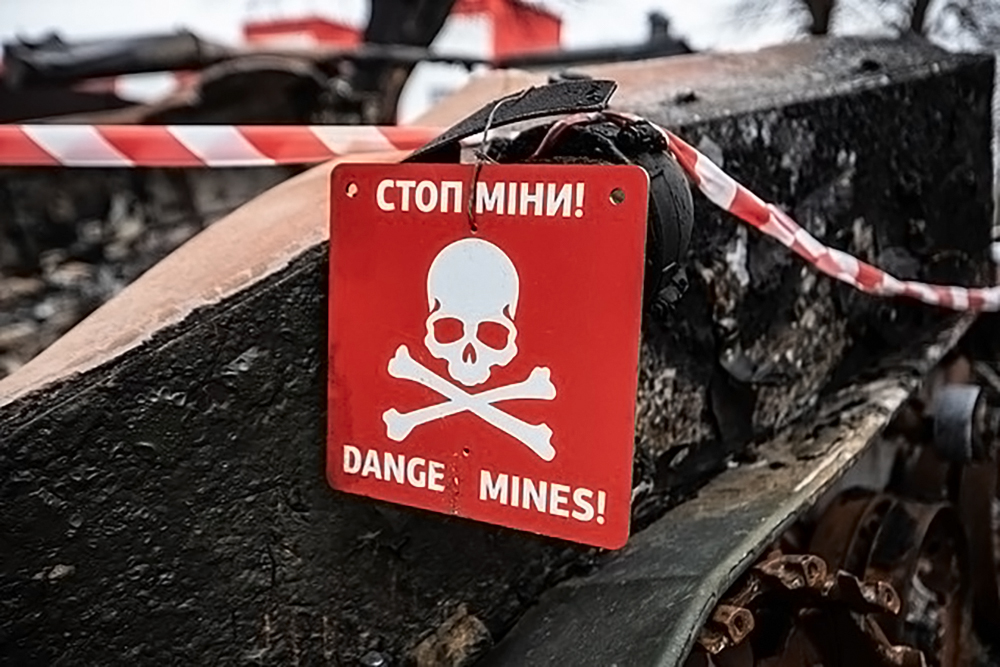
Swiss NGOs face huge challenge of demining Syria

Several Geneva-based NGOs are working to clear landmines in the new Syria after Bashar al-Assad's regime.
+Get the most important news from Switzerland in your inbox
Without adequate funding, it will take decades to demine the area, according to Handicap International (HI).
“We anticipate that the extent of mining is massive”, Aida Burnett-Cargill, who recently visited Switzerland and is leading the efforts of dozens of entities from the international and national demining community in Syria, told Keystone-ATS. Studies into the extent of the problem will take time.
The situation is “urgent” in Deir-Ezzor, Idlib and Aleppo, which have been affected by 13 years of civil war, adds the HI manager, who arrived in Syria in 2023. Underwater demining will be important and in urban areas, she said.
Since the fall of Bashar al-Assad, mines and explosive remnants of war have claimed more than 1,100 victims, including almost 500 killed. These figures are probably much lower than the real situation, according to Burnett-Cargill.
New centre expected
Many people have been amputated by the effects of the explosions. A quarter of the nearly 600 incidents took place in Deir-Ezzor. Because of the difficult access for humanitarian workers during the war, its role in the conflict, its agricultural land and the presence of a single hospital.
Three out of five victims are men. And two-thirds of the incidents have occurred on agricultural or unused land. Another problem is that local groups are trying to clear mines even though they have neither the equipment nor the skills.
But the political will is there. The new authorities are going to launch a National Demining Centre, attached to the Ministry of Emergencies and Disasters, which will absorb the Syrian White Helmets NGO. “It’s a good start,” says Burnett-Cargill. “In the end, the state should always take responsibility for clearing explosive remnants of war,” she says.
GICHD also present in Syria
The lifting of US sanctions should also facilitate the delivery of equipment and financial transactions. Donors have increased their contributions in recent months “but much more will be required”, adds Ms Burnett-Cargill.
Another NGO is the Geneva International Centre for Humanitarian Demining (GICHD), which is taking part in the meetings. It has been approached to help set up the National Demining Centre, and is due to start providing support in July.
“This is a crucial step” towards a collaborative, effective and sustainable approach, says GICHD director, Swiss ambassador Tobias Privitelli. Among the challenges in Syria, he sees alerting the population to threats, helping victims and cleaning up the territory. “We need a clear regulatory framework”, decided by Syria and linked to efforts to restore the country, adds the ambassador.

More
Demining: how the Swiss are helping to make Ukraine safer
Translated from French by DeepL/mga
We select the most relevant news for an international audience and use automatic translation tools to translate them into English. A journalist then reviews the translation for clarity and accuracy before publication.
Providing you with automatically translated news gives us the time to write more in-depth articles. The news stories we select have been written and carefully fact-checked by an external editorial team from news agencies such as Bloomberg or Keystone.
If you have any questions about how we work, write to us at english@swissinfo.ch

In compliance with the JTI standards
More: SWI swissinfo.ch certified by the Journalism Trust Initiative



























You can find an overview of ongoing debates with our journalists here . Please join us!
If you want to start a conversation about a topic raised in this article or want to report factual errors, email us at english@swissinfo.ch.